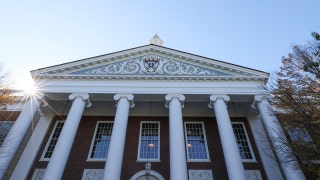People turn to faith during times of distress. In April, Pew reported that 24% of American adults believe their faith has grown stronger amid the COVID-19 pandemic. A recent Google Trends analysis shows an increase in searches like “the Bible and race,” “Bible quotes about race” and “love thy neighbor.”
It’s worth noting that the Bible is a book of healing: a book that offers hope for reconciliation with God and with each other and provides comfort for physical, mental, emotional and spiritual suffering.
As we have personal, national and global conversations about racial justice, let’s consider Scripture. The Bible teaches – and has for centuries – that all people are equal: made by God and loved by God.
JIM DALY: LIBERTY U'S JERRY FALWELL SCANDAL – HERE'S HOW CHRISTIANS SHOULD RESPOND
Tragically, people have manipulated Scripture to draw distinctions between themselves and others.
Last year at Museum of the Bible, we featured the exhibit “The Slave Bible: Let the Story Be Told.” Visitors were able to view a copy of the “The Slave Bible” from 1807, which was used to teach enslaved Africans to read – but only contained specific portions of Scripture. For example, the exodus story was removed to discourage slaves from contemplating freedom.
More from Opinion
The exhibit was a poignant reminder how our own fears and prejudices can shape the way we apply the Bible in our relationships with others, allowing us to twist Scripture in ways that justify abuse, inequalities and even enslavement. This is a tragic American legacy, one we continue to grapple with today.
But the Bible has also been a catalyst for social change, criminal justice reform and racial reconciliation. Currently, we have an exhibit on Dr. Martin Luther King Jr., whose civil rights activism was especially motivated by the writings of Hebrew Bible prophets Isaiah and Jeremiah and King David.
We have several artifacts that demonstrate the Bible’s role in racial justice. In the Great Awakening section of the museum, we share Phillis Wheatley’s poetry and explore the rise of Historically Black Colleges and Universities.
In our Civil War section, see Frederick Douglass’ “Narrative” and other abolitionist literature by Douglass, as well as the story of George Rome, an African American Civil War veteran.
As we study the healers from the past, like Dr. King and Florence Nightingale, we must celebrate the justice advocates and health care heroes of today.
There is also a historical link between Scripture and the medical field. For centuries, the Bible has led men and women to study, experiment and dedicate themselves to medicine and caring for the sick.
The Bible is full of stories of healing. In the Hebrew Bible, the prophet Elisha instructs Aram’s army commander Naaman to be healed of his skin disease by dipping himself in the Jordan River seven times (2 Kings 5). Many psalms are cries for healing. Isaiah prophesies the spiritual and physical healing of God’s chosen people that would come through the Messiah.
In the New Testament, Jesus frequently heals people. Before he went to the cross, Jesus promised his disciples, “Whoever believes in me will do the works I have been doing, and they will do even greater things than these, because I am going to the Father” (John 14:12 NIV).
These works include healing. In the book of Acts, Jesus’ promise was fulfilled as the apostles performed numerous miracles of healing through the Holy Spirit.
Members of the early Christian church who read the Scriptures and followed the example of the apostles established hospitals and hospices to care for the sick and dying. Monks operated hospitals across Europe, North Africa and the Middle East. Similarly, Jewish communities opened hospices and hospitals for the marginalized.
Hundreds of years after those institutions were established, renowned theologian and Methodist movement founder John Wesley published a collection of health advice because he believed God cared about the health of the body as well as the health of the soul. His “Primitive Physick,” released in 1747, offered practical remedies for ailments, as well as a model of modern CPR. Wesley’s text is currently on display at Museum of the Bible.
Nearly a century after Wesley published his health advice, Florence Nightingale, the mother of modern nursing, published her own book, “Notes on Nursing,” in 1860. Nightingale once said, “I don’t think any words have had a fuller possession of my mind through life than Christ’s putting himself in the place of the sick, the infirm, the prisoner,” referring to Matthew 25:31-46.
Her book, along with her personal story, helped advance the nursing profession – especially for women – and is foundational to nurse training programs around the world. The first American edition of “Notes on Nursing” is now on display at Museum of the Bible.
CLICK HERE TO GET THE OPINION NEWSLETTER
As we study the healers from the past, like Dr. King and Florence Nightingale, we must celebrate the justice advocates and health care heroes of today. They work tirelessly and selflessly to better their communities and minister to others.
Caring for those in need has always been a hallmark of Scripture-based communities, and many individuals have risked or sacrificed their lives to advocate the oppressed and care for the suffering. They still do. And they are still inspired by the Bible.








































